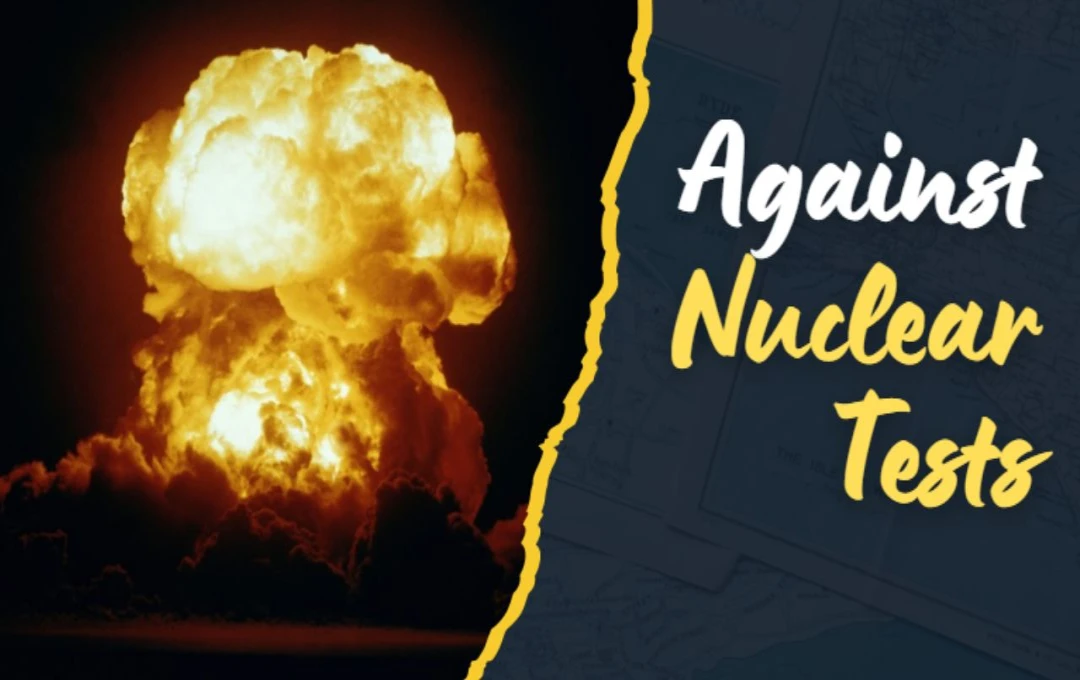International Day Against Nuclear Tests is observed worldwide on August 29th every year. This day symbolizes raising awareness about the dangers of nuclear tests and their devastating effects on humanity and the environment. This day is not just a warning; it calls upon global leaders, citizens, and youth to unite and create a nuclear-test-free world.
The power of nuclear weapons and the consequences of their testing are so destructive that their destructive capability and long-term effects leave a permanent mark on human health, the environment, and other aspects of life. The aim of this day is not only to highlight the terrible consequences of nuclear tests but also to convey a message for global peace, security, and nuclear disarmament.
Importance of the Day Against Nuclear Tests
The International Day Against Nuclear Tests was established in 2009 when Kazakhstan put forth a resolution in the United Nations General Assembly. Kazakhstan's experience was linked to nuclear tests, especially at the Semipalatinsk test site. The Soviet Union conducted over 450 nuclear tests at this site, which had a profound impact on the environment and the health of the local population.
Resolution 64/35 was unanimously adopted by the General Assembly, and this day was first observed in 2010. August 29th was chosen because it was on this day in 1991 that the Semipalatinsk test site was closed. This step was significant not only for Kazakhstan but for the entire world in the direction of stopping nuclear tests.
The goal of this day is to raise awareness towards implementing the Comprehensive Nuclear-Test-Ban Treaty (CTBT) and freeing the world community from nuclear explosions.
Side Effects of Nuclear Tests

Nuclear tests have numerous terrible effects. They are not only fatal to human life but also have a lasting impact on the environment and natural resources.
- Health Impact: Radioactive particles from nuclear explosions contaminate air, water, and soil. This leads to cancer, birth defects, and other serious illnesses. Over 2,000 nuclear tests have directly and indirectly affected millions of people.
- Environmental Impact: Radioactive materials spread into water, soil, and air, severely affecting agriculture, vegetation, and wildlife.
- Human and Social Impact: People living near test sites were displaced, their daily lives were disrupted, and an atmosphere of social inequality and fear was created.
Therefore, it is extremely necessary to ban nuclear tests internationally and provide a safe and sustainable future to the world.
How to Observe International Day Against Nuclear Tests

- Nuclear-Free Movie Night
Organize screenings of films and documentaries that highlight the dangers of nuclear weapons and their effects. Invite friends and family, and after watching the movie, discuss its repercussions and solutions. It's an excellent blend of education and entertainment. - Creative Expression
Spreading the message through art is a very effective method. The message against nuclear tests can be spread by creating posters, paintings, or murals. Display them in your locality or share them on social media. - Write to Leaders
Inform government officials or local representatives about the importance of nuclear disarmament by writing letters to them. This is a personal and impactful way to share your thoughts and concerns. - Theme-Based Quiz Night
Organize a quiz based on nuclear tests, peace treaties, and disarmament efforts. This activity not only enhances knowledge but is also a fun way to spread awareness. - Social Media Campaign
Share facts, stories, and your opinions on social media. You can spread the message globally by using hashtags like #EndNuclearTesting and #PeaceNotWeapons.
Global Purpose of International Day Against Nuclear Tests
The primary objective of the International Day Against Nuclear Tests is to highlight the dangers of nuclear tests and their destructive consequences. This day reminds all countries that it is essential to permanently end nuclear tests for human life, the environment, and global peace.
Through this, the world community receives the message that a nuclear-free world is possible not just through political treaties and agreements, but through citizen awareness and active participation.
The International Day Against Nuclear Tests reminds us that nuclear tests are not only dangerous to human life but also have lasting effects on the environment and society. This day is an opportunity to raise awareness and ensure global peace and security. Citizens, governments, and the world community must work together towards nuclear disarmament so that the future is safe and peaceful.















